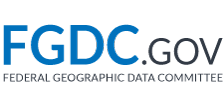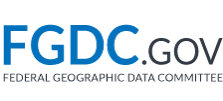Attendees
Bruce Ambacher (Historical); Gerry Barton (Commerce); Dave Catlin (EPA); Fred Broome, Leslie Godwin (Cultural and Demographic); Carolyn Davis (FEMA); Jim Fortner (Soils); Gyde Lund, Peggy Harwood (Vegetation); M.K. Miles, Penny Capps, Paul Nagele (Defense); Denise Perreca (Standards); Joel Segal (HUD); Tim Smith (Water); Bruce Spear, Kelly Wack (Ground Transportation); John Spencer (Geodetic); Gale TeSelle (Earth Cover); Gene Thorley (Chair); Dan Webb (Cadastral); Kathy Wortman (Base Cartographic, Earth Cover); Peter Lyttle (guest); John Moeller, Mickey Kilpatrick, Mike Domaratz, Kathy Covert (FGDC Secretariat).
Information Items
Summary Report of June Coordination Group meeting was approved; action items are complete, except for a report due at the August meeting from the Historical Data Working Group on the feasibility of developing a white paper on the costs of archiving digital data.
Competitive Cooperative Agreements Program (1996)
The contracting process requires that unsuccessful proposal submitters be notified before awards are made; this process should be completed shortly.
FGDC Directory
The FGDC Directory, provided as a handout, includes contact information for all known participants on any of the FGDC committees, subcommittees, and working groups. Customized retrievals may be made against the data base and mailing labels may be provided on request. Corrections and changes to the information should be submitted to Ms. Kilpatrick (703-648-4636).
Publication of Federal Map Information
Peter Lyttle, USGS Outreach Office, requested that Coordination Group members provide names of agency contacts who have information about new Federal map products for his column in GeoTimes, a publication of the geologic community. Mr. Lyttle intends to include information about maps and geographic information that would be broadly applicable for many purposes, including geologic studies.
ACTION
Coordination Group members are asked to provide to Mr. Lyttle the names of appropriate representatives in their agencies to serve as sources of information about new maps and digital geospatial data products. Mr. Lyttle can be reached at (703) 648-6943; email plyttle@usgs.govDiscussion Items
Standards Working Group
Ms. Perreca reported on the status of several standards being developed:
Cadastral
The review process for the cadastral standard is complete. When clarifications have been incorporated by the subcommittee, the standard will be submitted for endorsement as an FGDC standard.
Soils
SWG comments on the soils standard have been resolved and the standard is being readied for public review.
Vegetation
The vegetation standard is out for public review; comments are due by October 1.
Wetlands
Public review comments on the Wetlands Classification were resolved, and the standard is expected to be sent to the SWG in final form by August 1. It will then be submitted to the Coordination Group for endorsement as an FGDC standard.
Geodetic
The Geospatial Positioning Accuracy Standards, Part 1, Geodetic Networks, of the multipart accuracy standard has been submitted to the SWG for review and comment prior to being put out for public review.
Base Cartographic
The Geospatial Positioning Accuracy Standards, Part 2, National Standard for Spatial Data Accuracy, and the standards for digital elevation data and for digital orthoimagery are expected to be ready for review in September.
Consensus was reached that a consistent format is desirable for publishing FGDC standards; the format derived for the Metadata Standard will be used as a guide. FGDC Secretariat staff will oversee this process.
Ms. Perreca noted that a letter will be sent from the FGDC Secretariat inviting State councils to participate in the various subcommittee standards development efforts. After some discussion, a decision was made to invite participation of all organized State councils, regardless of their FGDC cooperating group status.
Action
SWG/FGDC Secretariat will invite participation of known State GIS coordinating councils in the FGDC standards development process. Councils will be encouraged to contact the chair of any subcommittees in whose standards activities they would like to be involved. Other information will be provided to enable councils to gain access to standards information through Internet home pages.Framework Discussion
Mr. Moeller stated that Mr. Domaratz would provide an update on framework development activities to prepare the Coordination Group to begin to define appropriate roles for agencies and subcommittees with framework theme responsibilities and to develop strategies for framework implementation. The third of four framework workshops will be held in Baltimore July 23-25. The workshop will provide an opportunity for framework pilot project participants and FGDC subcommittees to share experiences and ideas for implementing framework.
Mr. Domaratz called attention to the handouts that provided an overview of framework development to date. He also requested feedback from the Coordination Group on the outline for the framework implementors handbook. (The outline was Item C in Mr. Domaratz handout at the meeting.)
Action
Coordination Group members are invited to comment on the proposed plan for the framework implementors handbook that will be developed by a contractor. Responses to Mike Domaratz were requested by Monday, July 15.Coordination Group members identified the following factors for consideration in developing a strategy for Federal participation in framework implementation:
- Federal agencies need geospatial data now to accomplish their missions and mandates; The diversity of the Federal geospatial data community mirrors that of the Nation's geospatial data community;
Federal agency mission-related responsibilities for a theme may cover only a small part of the area of national interest (e.g., transportation data); this correlates to the area of concern for agency representatives as compared to the responsibilities of subcommittee chairs;
Federal needs and contributions related to the framework range from very localized AM/FM activities to national analyses;
Different organization, disciplines, and regions have different starting points and different goals; Interaction and coordination with other public and private organizations are required for the success of Federal programs;
One size does not fit all, but there are economies from cooperation that are beneficial; a related challenge is to balance costs to the data producer and the data user so that duplicate efforts are avoided;
Much technology needed to support all aspects of the framework does not exist. Needed technology must be available and supported widely;
It is not always possible to coordinate all items at all times; in some instances, parallel (duplicate) work will occur;
The current situation in the community is chaotic, and is likely to remain so.
Members also identified items of contention:
- The need, ability, priority, and timeframe with which to pursue the integration of different themes;
- Start with data sets of national coverage and fill in with better data;
- Start with most current, accurate, and complete data and build the framework up from these data;
- Emphasize a common base (such as digital orthophotos) as a starting point, and insist that vector data register at least to this base.
The target level of resolution for framework data; how much variance by theme and within a theme;
The starting point for Federal efforts. Approaches discussed include:
- General game plan: Meet Federal needs and mandates with emphasis on cooperation. Pool Federal resources. Set minimum standards with emphasis on flexibility. Establish a proactive cost share approach with emphasis on predictability, flexibility, stability, and fairness;
Identify and provide useful incentives;
Support development and implementation by the vendor community of technologies needed for a more robust framework;
In cases where parallel work occurs, be proactive in efforts to bring different activities together in the longer term. Do not expect activities to just come together;
Apply resources to develop the ability to use data from other organizations;
Maintain flexibility to work with others as opportunities arise.
- It is appropriate for Federal agencies to provide leadership in implementing the framework.
Partnerships are essential to this process; development of incentives to participate is important.
Framework development will be based on the seven themes with related standards and data collection strategies that will be integrated into an overall plan.
The FGDC should provide leadership in working with the private sector to develop tools (e.g., for conflation and generalization).
Framework data in the public domain continues to be the goal; however, economic issues related to proprietary value-added data, cost recovery, and private sector profits must be considered.
A process should be established to put together a national strategy/integrated plan.

